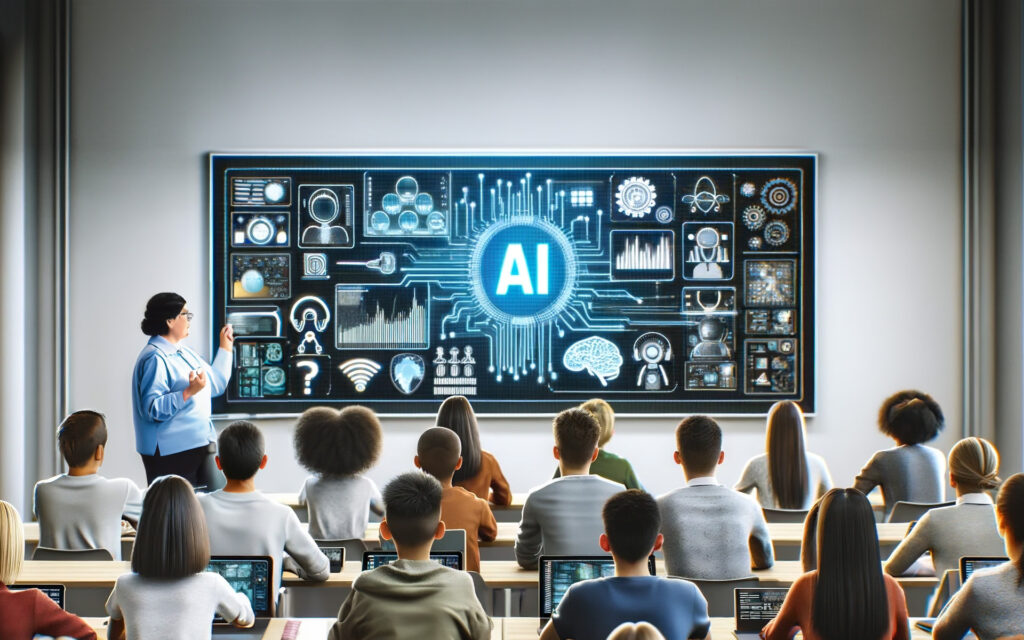This last weekend I watched a pretty interesting and, frankly, unusual news segment on ABC News regarding AI in the classroom, unusual for its length and depth for a local newscast. It was a little over 20 minutes long and Journalist Marc Brown interviewed two different local professors: Yannis Yortsos, Dean of the Viterbi School of Engineering at the University of Southern California and Dr. Tyrone Howard, Professor of Education at UCLA.
- You can watch the full segment here.
I’m sure none of you will be surprised to know that the two professors talked about both the pros and cons of AI. Nothing new there.
This got me thinking about our challenges regarding how we handle AI in our classrooms, and not only how we as teachers might use it, but especially regarding our students: Do we forbid its use? Do we encourage it? And if so, how do we teach that?
In countless recent conversations — and I’m sure you’ve had or overheard many yourself — it seems that our teaching community is mixed on how to answer these questions and unsure how best to proceed. As was emphasized during Marc Brown’s interview, “Like almost every new technological advancement, artificial intelligence has generated trepidation and even worry for many people.” For those of us who have been teaching long enough to remember, many teachers were initially very resistant to the use of calculators in their classrooms. Now they are ubiquitous and accepted pretty much everywhere. Although AI is certainly different, there are definite parallels to consider and inform our thinking on the subject.
While many teachers, myself included, are very excited about the possibilities and opportunities which AI presents, a significant number are much more reluctant and some are adamantly opposed. This is completely understandable, but it is not a realistic approach. AI is here. In fact, it’s been here for quite some time.
A really important question, then, is this: How can we perhaps best help the naysayers among us see the importance of embracing AI in our classrooms and — while not ignoring issues like cheating — recognizing it as a powerful and necessary tool for our students to learn and master, because it ain’t going away.
And so, in the spirit of what now seems the quaint Common Core State Standards’ notion of “College and Career Readiness,” I did some research and came up with a list of Top Ten Reasons We Need to Teach AI:
- AI Adoption and Job Market Impact: Global job market will experience both growth and decline due to AI, with 69 million new jobs and 83 million jobs eliminated by 2027 (World Economic Forum, May 2023).
- Reskilling and Training Necessity: Emphasizes the importance of reskilling the workforce for new jobs created by AI (Joint Economic Committee, U.S., September 2023).
- Increased AI Labor Demand: AI job postings across all sectors have notably increased, signaling growing labor demand in AI-related fields (Stanford AI Index, April 2023).
- Sector-Specific AI Impact: AI revolutionizes sectors like healthcare, finance, and retail, indicating specific career paths for future job opportunities (Global AI Industry Report, June 2023).
- Economic Growth via AI: AI expected to contribute significantly to economic growth and productivity gains (Global AI Industry Report, June 2023).
- AI’s Influence on High-Paying Jobs: Higher-wage, white-collar jobs are more likely to be impacted by AI, suggesting a focus on analytical skills and advanced education (Pew Research Center, July 2023).
- Gender and Racial Disparities in AI Exposure: Women, Asian, and White workers are more exposed to AI than other groups, highlighting diversity considerations in future job markets (Pew Research Center, July 2023).
- Global AI Market Growth: The AI market, valued at $62.35 billion in 2020, is expected to continue its rapid growth, indicating a booming industry for future careers (Global AI Industry Report, June 2023).
- AI’s Role in Job Transformation: AI is leading to workforce transformations, necessitating a shift in traditional job roles towards more AI-centric skills (McKinsey Report, August 2023).
- Educational and Agricultural Job Growth: Significant job growth predicted in education and agriculture, driven by technological advancements and green initiatives (World Economic Forum, May 2023).
We have a daunting task to prepare our students for college and careers after high school with the likelihood that they will possibly be working in jobs that don’t yet exist using technologies that haven’t yet been invented. Let that sink in!
Many, maybe even most, of our students will be working in jobs that don’t currently exist using technologies that haven’t yet been invented. Yeah, that.
But as these reports show — while there are definite challenges many people will face due to job replacements and displacements — there are also countless opportunities which we can help prepare our students for. If only we will.
And we can, and we will. I’d strongly encourage you to take the time to take a deeper dive on what these recents studies and reports have to say and consider how they can better inform your teaching. It will be time well spent.
Adaptation to new technologies, while challenging, is both necessary and inevitable if we are to be successful in our mission as educators. That’s the great part about being part of CCIS. We are a dedicated team of Independent School teachers, administrators and our amazing support staff.
I’m looking forward to seeing as many of you as possible in our upcoming January CCIS Conference in San Diego, where AI will be one of the more prominently featured topics of discussion with the express intention of helping us all be better prepared to teach AI in our classrooms.
I encourage you all to come prepared to share your own ideas, experiences and successes in this regard.
Until then,
Daniel O’Brien,
CCIS Vice President
And yes, I used AI to help me locate these studies, analyze them, and compile them. But you knew that, right?
